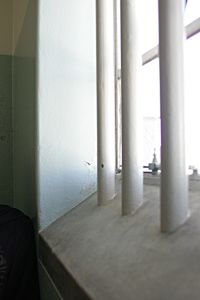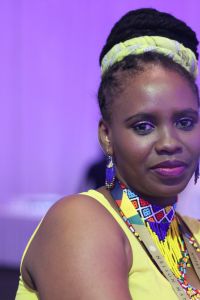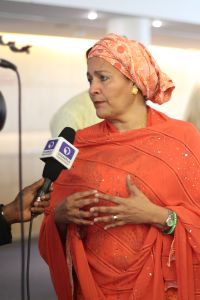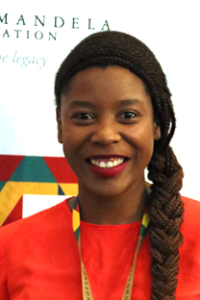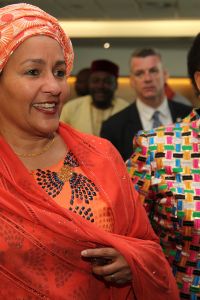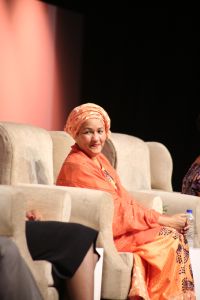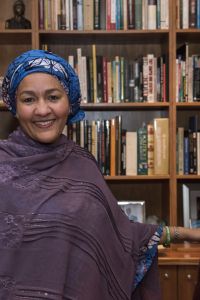On Saturday, 25 November 2017, the Deputy Secretary-General of the United Nations, Amina J Mohammed, delivered the 15th Nelson Mandela Annual Lecture at the Cape Town International Convention Centre.
Under the theme “Centering Gender: Reducing Inequality Through Inclusion”, Mohammed’s lecture focused on what she called “the most pervasive inequality globally – in every country and every society”, that of gender inequality.
To reach across borders is to transcend differences
Recounting her childhood growing up in Nigeria, Mohammed recalled how she first learned about apartheid in South Africa. At age 11, she asked her father about a visit to South Africa, and he explained why it would not be possible.
“In apartheid South Africa, we would be segregated – mother, father and child – by race. The horrifying reality saddened me – that human beings could such a thing to one another,” she remembered.
It was former President Nelson Mandela who had inspired her that change is possible. A figurehead of national transformation, Madiba remained human and kept the world full of hope. “He would have preferred to live as a man – to remind us that the possibility of such humanity exists in each of us,” she argued.
Madiba’s profound legacy contains the inspiration we need, she said, to reduce gender inequality through inclusion and sustainability.
“To reach across borders is to transcend differences, protect our core values and combat all that threatens our humanity. Today, our world needs this more than it has ever done. The fabric of our society is fast losing its vibrancy and strength,” she added.
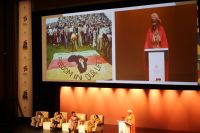
UN deputy secretary-general Amina Mohammed delivers the 15th Nelson Mandela Annual Lecture.
(Image: NMF)No more will violence against women be treated with indifference
Mohammed recognised the significance of the official launch of the 16 Days of Activism today, which highlights proactive undertakings to curb the epidemic of violence against women in South Africa: “We launch today the 16 days of activism and mark the International Day of the Elimination of Violence against Women. We also witness a now global movement, building momentum to say no more will this violence against half our population (our mothers, our sisters, our daughters) be invisible or, worse still, treated with indifference.”
South African women have been at the vanguard of change globally, she noted.
“In the mid-1950s, some 20 000 women of this country marched to protest the pass laws. Their slogan was powerful: You strike a woman, you strike a rock. Many have cited this moment as a turning point in the struggle against apartheid.
“From that moment in the 1950s, through the struggle, the negotiations for a democratic country, and the constitutional assembly that provided this country with one of the most progressive constitutions globally, South Africa women have been leaders for change,” maintained Mohammed.
Charlotte Maxeke, Lillian Ngoyi, Albertina Sisulu, Gertrude Shope, Ruth First, Fatima Meer, Adelaide Tambo, Emma Mashinini, Winnie Madikizela-Mandela, Sophie de Bruyn, Helen Suzman are Mamphela Ramphele are just some South African leaders who have been at the forefront of change, the product of an incredible women’s movement in South Africa.
Given the opportunity to participate fully, women have the capacity, resources and potential to address the most pressing challenges facing the world.
“What is needed is to break down institutional and attitudinal barriers and invest in the full contribution of women and girls to their societies and their countries,” Mohammed argued.
Madiba’s living legacy and vision of equality for all
Mandela was a man of conviction. He would never compromise on his values, he lived through his family's suffering. When he declared that he was prepared to die for an ideal and democratic society, this was not a false promise.
“The state could rob Mandela of his freedom, but never of his dignity,” stated Mohammed.
Gender equality was central to Madiba’s vision of equality, and central to the struggle for freedom. His was a reflection of leadership that understood that equality cannot be selectively applied; leadership that held a vision of a society where there was no discrimination on the basis of race, class, gender or any other category.
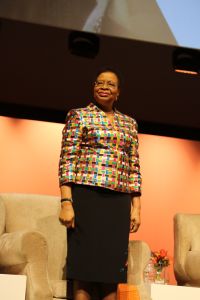
Nelson Mandela's widow, Graça Machel, who was praised by Amina Mohammed for her work.
(Image: NMF)Nelson Mandela taught that freedom is indivisible. Speaking before the first Parliament in 1994, Madiba declared that “freedom cannot be achieved unless the women have been emancipated from all forms of oppression”, and importantly, he practised what he preached.
In 1992, at an historic ANC conference in Durban, Mandela stood up to men who opposed his firm pledge of a 30% quota for women MPs. Indeed, during the democratic transition women’s representation in Parliament increased tenfold, from 2.7 to 27%.
Sadly, the long walk to freedom for women and adolescent girls globally remains unfinished, said Mohammed.
“Around the world, women still hold less than one-third of senior management positions in the private sector. Fewer than one quarter of all parliamentarians are women. Violence against women – in homes and war zones – remains a global pandemic. Up to one in three women has experienced violence in her lifetime. There are nearly 50 countries that do not even have laws against domestic violence. In 37 countries, marriage excuses rape.”
What is required now, said Mohammed, is a new narrative that includes women and girls in all aspects of society.
A sustainable move towards the future
While we have seen progress to address violence against women in certain countries, we have seen a pushback in others.
“In the workplace, women earn 70c to every dollar that is earned by men. In a study released by the World Economic Forum earlier this year, it states that it would take 217 years to equalise the pay opportunities between men and women. Shockingly the number has increased from 170 years calculated last year – so is the gender equality gap increasing or decreasing, really?” asked Mohammed.
Mohammed maintained that the empowerment of women is more than a social imperative or a matter of justice; it is essential to achieving sustainable development, protecting our environment and securing peace.
“When women are kept out of the labour force, everyone pays the price. Put another way, we know that women’s equal participation in the labor force would unlock over US$12-trillion in global growth. Money that could be used to further access to education, health and services for all.
“We have evidence that one of the greatest predictors of stability and resilience to conflict is levels of gender equality in a society, and that women’s meaningful participation in peace processes increases the sustainability of peace by 30% over the long term,” she said.
There could not be a more important moment to realise the importance of gender equality to the challenges that we face.
Speaking about violent extremism, and her recent encounter with young female survivors of violence in Nigeria, Mohammed maintained that gender equality is very much a part of the solution to bringing peace to nations where young people can become part of the conversion and not excluded or subjugated.
Terrorists are not born, said Mohammed. They are shaped by the environment they live in, they are shaped by violence they encounter in their environments. Women survivors of terrorism, and female survivors of extreme violence, are committed to building a better world, despite the horrors that they faced.
I so am deeply grateful to the @NelsonMandela Foundation for this tremendous honour. Thank you. It was a humbling and amazing experience to deliver the 2017 Annual Lecture on #CenteringGenderِ #WhyGender. Read the full lecture: https://t.co/fX6mad34kz pic.twitter.com/q8qpb2gmrZ
— Amina J Mohammed (@AminaJMohammed) November 25, 2017
“Beyond terrorism, we also face the major threat to security and development posed by climate change, exacerbating poverty and vulnerability of the poorest in our societies,” she said.
And women, especially in poorer countries, are more vulnerable to the impacts of climate change.
“In the 1991 Bangladesh cyclone, five times as many women as men died. In the Indian Ocean tsunami, women accounted for more than two thirds of all deaths. In recent months the Caribbean witnessed hurricanes that wiped out the GDP of a country overnight. These storms will become more intense and more frequent in the coming months and years,” she added.
The crises as a result of climate change can be turned into opportunities to build back better for all, addressing the investment gap for women that reduces the potential and value of a country by over 50%.
“Socially, environmentally and politically, women have proven that when you invest in them, you get results for all,” she said.
The question is how to build on these gains and achieve true gender equality.
Investing in empowerment for all
How can true gender equality be achieved?
The answer is investment in women’s empowerment in all its ramifications, as well as a cultural shift in mindsets so that women’s equality is a given in all societies and not a luxury.
In 2015 the United Nations 2030 Agenda for Sustainable Development was born. At its core is an agenda of empowerment of women and girls, a necessary part of a universal plan of action for ending poverty and ensuring a life of dignity for all.
The sustainable development goals set out in the 2030 Agenda can change history by ensuring women’s rights and female leadership around the world, but can only be fully realised if the values of inclusion are applied seriously and if nobody is left behind.
“The sustainable change that we need to see will only be possible if we are including young people – girls and boys,” maintained Mohammed.
“Gender is not equal to women. Gender inequality, norms, and stereotypes affect men and women, girls and boys. When young boys are taught that it is not manly to cry, they learn to suppress their emotions. When young men are taught that violence is masculine and accepted, we create the next generation of those who seek solutions at the barrel of a gun. When society dictates the role of men as breadwinners or aloof and distant fathers, we disempower families and create public policies that don’t match the reality of our households, our communities and our societies,” she said.
Gender inequality affects everyone, and addressing it is equally our shared responsibility.
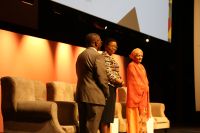
UN deputy secretary-general Amina Mohammed (right), with Nelson Mandela Foundation chairperson Professor Njabulo Ndebele and Graça Machel.
(Image: NMF)The #MeToo movement on social media, and the He4She campaign, coupled with growing conversations engaging a younger community on digital platforms about gender-based violence and discrimination, is offering new inroads into conversations about a topic that has remained muted for far too long. These platforms offer an opportunity to shift the tide, and one we should collectively seize for positive change.
“We need to galvanise the international community to invest in women and girls – and to give them space – so they can contribute to progress,” she said.
“Collectively, we see the hills before us – and we are challenged to climb them. For climb we must. There is no other option. If we feel defeated, we can return to Madiba’s indomitable bravery and humanism,” she added.
Leaving us all with a message, Mohammed closed with a profound call to action.
“We need to hear louder voices about the wonderful things our girls are doing. We need to sell the story of successful women in Africa!
“Just as the world came together to support the end of subjugation on the basis of race in this great country, we need today to birth a new movement and calls for true equality, everywhere. We as leaders must stand up and take collective responsibility for our current failings, but also for the actions we must take to end the conflict, injustice, inequality, corruption and ensure true inclusive democracy, peace and prosperity for all our people.”
Mohammed challenged her audience with a call to action “to invest in the missing 50% of our human asset base, the potential of our women and unleash their power for good”.
She said that “to make good on the new era of the Sustainable Development Goals, starting with Goal 5 (gender) as your docking station for the other 16 goals, will create a world of true gender equality”.
